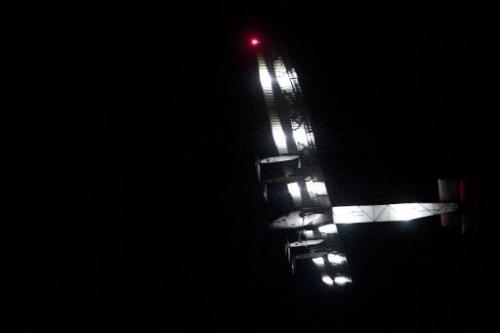Solar Impulse 2 landed in China, the world's largest carbon emitter, earlier on Tuesday as it completed the fifth leg of a landmark global voyage to Earth driven by the sun alone.
Under the control of pilot Bertrand Piccard, this revolutionary aircraft landed at Chongqing Airport on Monday at 1:35 am (1735 GMT) after 22 and a half hours of flight from Myanmar. Its huge wingspan was completed The leader of the platoon is illuminated. light.
The aircraft is expected to make a short stop in the southwestern city and then quickly travel to Nanjing, about 270 kilometers (170 miles) from Shanghai, but the aircraft has been delayed due to weather and safety considerations. The team currently hopes to stay for a few days and wait Better conditions for eastern travel.
"We are tired, but we are still very, very happy to be in Chongqing," said Michael Anger, a mission engineer on the project's website.
"In China, the demand for this aircraft is very high, especially for Bertrand, and for the team preparing for two consecutive flights, it was very high, and then this afternoon the second was cancelled due to the bad weather in Nanjing. Flights. "
Piccard is one of the two Swiss pilots of this solar-powered aircraft. It resists severe cold in the cockpit as low as -20 degrees Celsius (-4 degrees Fahrenheit) and the general flight in Yunnan and Sichuan provinces. Certainty.
On his last tour, Piccard passed China by a specially designed balloon, but only if he personally flew to Beijing to negotiate the conditions would the balloon avoid the country's large area. Supporters of SolarImpulse 2 stand near the plane before taking off from Mandalay, Myanmar , to Chongqing, China on March 30, 2015
For most of the journey, Piccard was flying at high altitudes, so more oxygen had to be used on the 1,375 km (854 miles) route.
Flight Imaging Director Raymond Clerc of Solar Impulse said in a video interview on the project website that flying from Mandalay to Chongqing was the most difficult.
The team behind Solar Impulse 2 has more than 17,000 solar cells, and the team hopes to promote green energy through bypass attempts.
The joint venture was ridiculed when the aviation industry debuted, and has since been praised by the world, including UN Secretary-General Ban Ki-moon.
Muscat is the first of 12 planned stops for the world's first flight from Abu Dhabi. The total flight time is about 25 days and the duration is five months.
